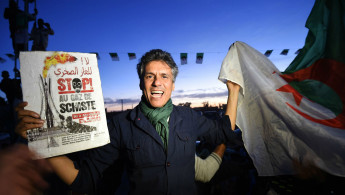Fracking won't fix Algeria's oil woes
Organised protest over "fracking" - hydraulic fracturing to release oil and gas in shale rock - is something more associated in the minds of most British people with the genteel Home Counties, rather than the remote stretches of Algeria's Sahara desert.
Yet, over the past two months, a major protest movement has swelled into open demonstrations in Salah and Tamanrasset, 1,000 kilometres south of Algeria's capital, Algiers.
The Algerian government has responded with incredulity and irritation to public protest over a policy which it regards as essential to the country's future.
Looking back
The reasons for the government's irritation are reflected in Algeria's declining production of oil and gas and its soaring domestic consumption. Between 2003 and 2013, for instance, oil production declined from 79 million tons a year to 68 million tons, despite a small rise in production between 2012 and 2013 of 2.7 per cent.
Domestic consumption, however, rose from 10 million tons to 17.5 million tons over the same period, growing by five per cent alone between 2012 and 2013.
Gas production has followed a similar pattern, falling from 82.8 billion cubic metres a year to 78.6 billion cubic metres - while domestic consumption rose from 21.4 billion cubic metres a year to 32.3 billion cubic metres a year over the same period of ten years.
The net result has been that Algeria has had declining amounts of oil and gas for export, yet the country depends on hydrocarbon export sales for 98 per cent of its foreign earnings - which also generate 60 per cent of its all-important budget revenues.
For a country with a heavy dependence on imports to satisfy consumer demand, declines in its dominant export product create a scary scenario. And the picture is made much worse by the recent collapse in oil prices which promise to reduce revenues by more than half in the coming year.
Even with its cushion of $190 billion in foreign exchange reserves, the Algerian government has already decided to cut back drastically on public expenditure.
It is in this context that the government has seized upon shale oil and gas as a potential saviour. Although the country has abundant reserves of both - 12 billion barrels (1.5 billion tons) of oil and 4,500 billion cubic metres of gas - the sad truth is that the national oil and gas company, Sonatrach, has not been very effective at exploiting them and Algeria's laws do not encourage foreign investors.
Shale deposits offer a new opportunity, for Algeria reportedly has the world's third-largest shale gas deposits after China and Argentina.
This is between 20 and 35 trillion cubic metres (19.820 trillion cubic metres according to Sonatrach), which is likely to be offered to foreign investors under new, more attractive terms.
The government expects to produce up to 30 billion cubic metres of tight gas a year by 2020, in addition to its more conventional production, and announced that it had drilled its first successful well on 27 December last year near In Salah.
The Sahara speaks
The announcement sparked off a round of demonstrations in south Algeria against the proposed $70 billion fracking programme, with the protests centred on In Salah but eventually spreading to Tamanrasset and four other desert towns.
The protests have grown in intensity over the weeks as local populations realised the implications of the programme for the very fragile desert environment.
| Opposition politicians have flocked to endorse southern grievances. |
The root of their protest, despite repeated government reassurances, is that they fear that fracking will suck dry the very limited local groundwater resources, destroying oasis agriculture and pastoralism in its wake, as well as adversely affecting the surrounding countries of Tunisia and Libya.
Their protests have also incited national and international attention, with Algeria's Coordination Nationale pour les Libertés et la Transition Démocratique, which brings together the country's opposition parties, heading up concerted support from non-governmental organisations in Europe and elsewhere in North Africa.
It is the first time since October 1988 that there has been such coordinated protest in Algeria.
This feature alone has seriously unsettled the government, despite the support it had received from the oil-and-gas industry and from the French premier. Incidentally, Francois Hollande will not allow fracking in France - an inconsistency that earned him the sobriquet of "hypocrite" in the local press.
Eventually, at the start of March, protesters set up camps in In-Salah and tried to occupy a nearby facility belonging to the Halliburton Corporation which had been responsible for the first shale well.
The police tried to kick them out, but the intervention, in turn, provoked the demonstrators into attacking public buildings and state property in Ouarghla, Tamanrasset and In-Salah itself.
That brought the army in, against its own promise more than a decade ago that it would never again intervene in domestic issues after its experiences in the 1990s, to patch up a shaky peace.
Of course, the protest has also become a metaphor for the deep frustration Algerians feel towards their authoritarian government and its invalid president. Opposition politicians have flocked to endorse southern grievances.
This isn't the first time that protest in the south has flared because of the region's marginalisation, in terms of development and employment.
Normally the government has been able to buy off such protests but, this time, economic circumstances may make such an approach more difficult.
No wonder the government is worried, for this protest might just blossom into those that it managed to stifle four years ago, in January 2011.



